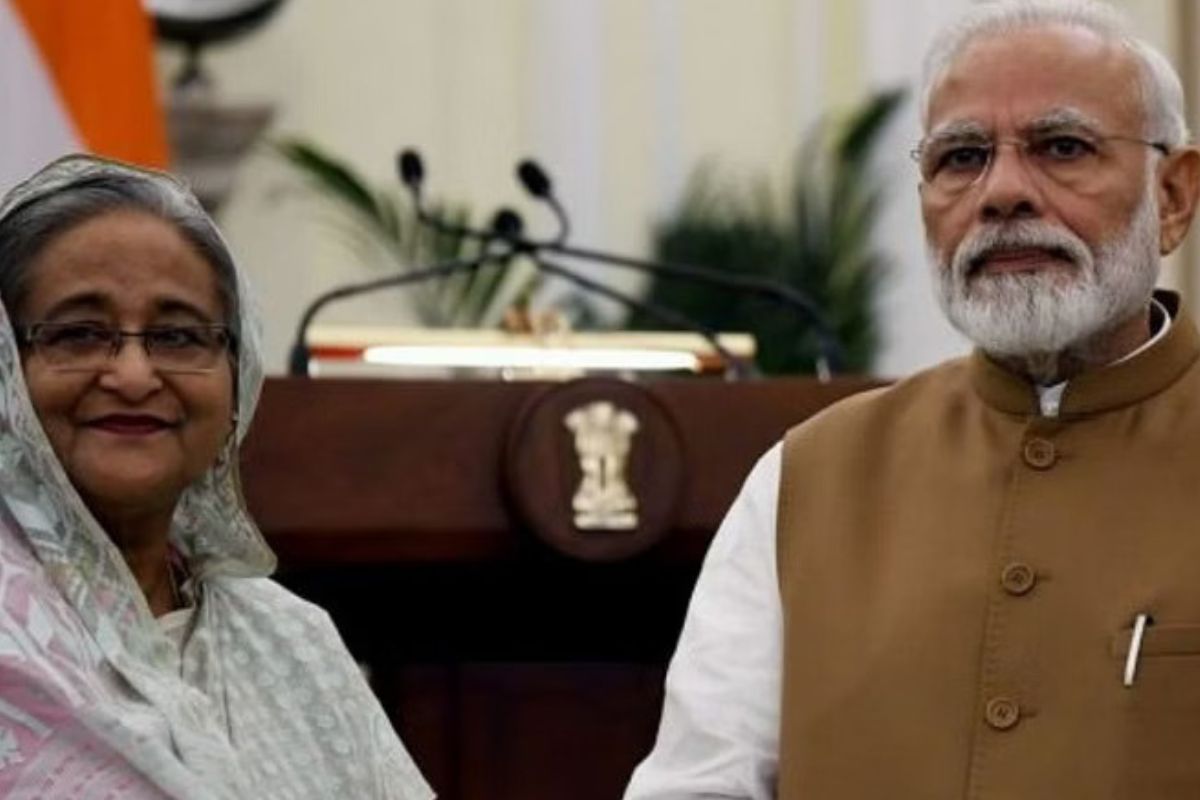Former RBI Governor appointed Principal Secretary-II to PM
Dr P K Mishra is the Principal Secretary-I to the Prime Minister.
Ahead of her crucial scheduled official visit to India from June 21-22, Bangladesh Prime Minister Sheikh Hasina is scheduled to visit India from June 7-8 to attend her Indian counterpart Narendra Modi’s swearing-in ceremony after he won a third term.

A file photo of Indian Prime Minister Narendra Modi and Bangladesh PM Sheikh Hasina (Photo: ANI)
Ahead of her crucial scheduled official visit to India from June 21-22, Bangladesh Prime Minister Sheikh Hasina is scheduled to visit India from June 7-8 to attend her Indian counterpart Narendra Modi’s swearing-in ceremony after he won a third term. Earlier, Sheikh Hasina congratulated Narendra Modi on the NDA’s win in the 18th Lok Sabha elections.
Mr Modi had expressed gratitude to Sheikh Hasina for her kind wishes about his reelection to a third term. He tweeted, “I look forward to working together to further strengthen our people-centric partnership,” citing the historical ties that have grown significantly over the last ten years between Bangladesh and India. Hasina’s visit demonstrates not only how important it is for Bangladesh to plan its ties with India, but also how India really views Bangladesh as a good neighbor and has shown excellent neighborhood diplomacy. Bangladesh is similarly prepared to collaborate with India in order to advance the sensible and steady growth of bilateral ties, which is in the best interests of both nations’ citizens.
Advertisement
This further demonstrates the commitment of both governments to strengthening their relationship. Given how Bangladesh stresses its positive connections with India and how the two leaders have a cordial and personal relationship, Prime Minister Hasina was among the first international leaders to congratulate Mr. Modi. As the relationship between Bangladesh and India approaches its 53rd anniversary in December 2024, this year marks a significant turning point as both Bangladesh and India have just held their national elections. The leadership in both nations thus has a reflective moment to evaluate progress and map out potential avenues for collaboration. The conversations, meetings and engagements during Hasina’s trip may demonstrate how eager the Indian government and people are to work with Bangladesh by increasing cooperation and reciprocal growth.
Advertisement
This has grown significantly, especially when it comes to commerce, trans-shipment, transit, tourism, and important government-to-government ties. On May 9, during the pivotal national election, India’s Foreign Secretary Vinay Mohan Kwatra travelled to Dhaka to demonstrate the breadth of ties between Bangladesh and India. In addition, he invited Prime Minister Sheikh Hasina to visit India on June 21- 22 and they spoke about significant bilateral concerns.
Important topics including Teesta, visas and border killings were also addressed by the Foreign Secretary when he was in Dhaka. However, in addition to highlighting the strong relationship between the two countries, Sheikh Hasina’s swift and receptive visit to Delhi after Mr Modi’s inauguration for a third term revitalized the idea of an IndiaBangladesh community shared by common development and standing. Delhi and Dhaka’s relationship has long been described as an unshakable, unwavering friendship that is based on respect, trust, and a dedication to real, people-centered collaboration.
With PM Modi and PM Hasina promising to keep cooperating to further strengthen the long-standing and close ties under the renewed mandate towards realizing the vision of Viksit Bharat 2047 and Smart Bangladesh 2041, there are many opportunities for both India and Bangladesh to deepen their relationship. In order to create a favorable environment for Bangladesh’s national development, the new Indian government is expected to uphold the nation’s consistent and stable foreign and domestic policies, and continue to forge stronger ties with its neighbors, including Bangladesh, while acknowledging the significant improvements the lives of their people in the past ten years. Additionally, both leaders have expressed their desire to further strengthen the transformative relationship in all areas, including people-to-people contacts, energy security, connectivity, including digital linkages, and economic and development partnerships. Under their leadership, ties between Bangladesh and India have significantly strengthened. During the last ten years, friendship has grown.
The issue of security in India’s north-eastern states has been resolved by Bangladesh. Both countries may now work to strengthen their bonds in the days ahead. The attempts to execute the Teesta deal and renew the Ganga pact, as well as put an end to border murders, would continue if the two administrations work closely. Several agreements, such as the exchange of enclaves, the land border agreement, road transit, and permission to utilize the sea ports of Chittagong and Mongla, were inked between the two nations under the Modi-Hasina administration.
The partnership between India and Bangladesh will thus get a lot of attention since it demonstrates a dynamic and evolving collaboration that goes beyond basic infrastructural assistance. The healthy and stable relationship between India and Bangladesh serves both countries’ interests and promotes peace and prosperity both locally and globally. The multifaceted connection between Bangladesh and India should continue to flourish. Both administrations should continue to have cordial ties as long as they achieve their common interests as it is necessary to preserve regional peace and stability.
(The writer is a Dhaka-based columnist.)
Advertisement